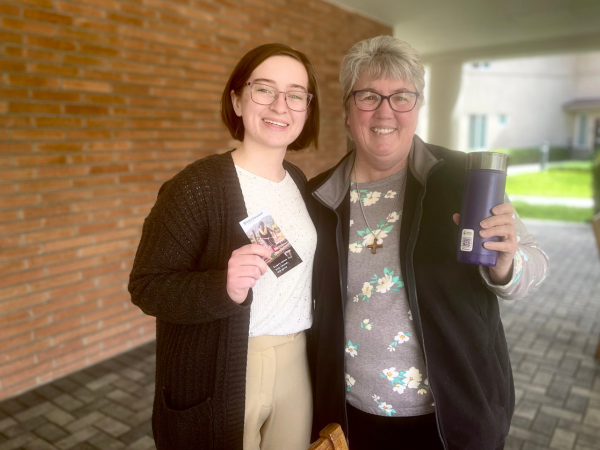In Laudato Si’, Pope Francis’ encyclical on care for our common home, we are invited “to see nature as a magnificent book in which God speaks to us and grants us a glimpse of his infinite beauty and goodness” and urged to engage in “a new dialogue about how we are shaping the future of our planet.”
In response to Laudato Si’ the Sisters of St. Joseph of Orange have developed a Laudato Si’ Action Plan focused on water. It seeks to respond to the cries of the Earth and poor through prayer, education, action, and advocacy.
The Sisters of St. Joseph of Orange’s congregational commitment to water reflects Pope Francis’s emphasis on the issue of water. Essential to all life on Earth, water sustains creation. According to Laudato Si’, all humans have a right to safe drinking water, yet many struggle to access clean water. This denial of human dignity is often rooted in humanity’s pollution of our shared waters.
According to EarthDay.org, Each year, we produce about 380 million metric tons of plastic. We rarely dispose properly of the plastic that we make into bags, bottles, straws and more. Instead, almost every piece of plastic ever produced still exists on our planet. While some plastic is recycled, most becomes pollution or arrives in landfills. Unfortunately, plastics do not simply remain in landfills. As plastics break down into smaller and smaller fragments, they slowly contaminate water and soil, spreading throughout creation.
From the Santa Ana River to the Great Lakes to the Pacific Ocean, water across our planet is polluted with plastic. Large plastic pollution, such as fishing nets, food wrappers, and beverage containers, endanger wildlife by entangling or choking animals, spreading invasive species, or harming animals that ingest them, as explained by the National
Oceanic Atmospheric Administration (NOAA).
Other miniscule plastic pollution can be invisible to the naked eye. According to the UN Environment Programme, microplastics, plastic fragments smaller than 5 millimeters, can be found everywhere, including freshwater resources. Nearly impossible to remove from the environment, microplastics in freshwater spread disease, are ingested by humans and animals, and release harmful toxins that can cause inflammation, hormonal disruption, shifts in gene expression, or behavior changes. Though these chemicals have been shown to have disruptive effects in many creatures, the long-term impacts of microplastics are unknown.
Plastic pollution in our water presents a threat to creation that we, as Catholics, are called to protect. The United States Conference of Catholic Bishops (USCCB) explained that “Care for God’s Creation,” one of the seven principles of Catholic Social Teaching, calls each of us to be stewards of our common home. We have a responsibility to care for our Earth and all its inhabitants: the insects, plants, animals, and humans that are all part of God’s creation. Unfortunately, plastic pollution in our waters disrupts the relationships between all of us who live and thrive among God’s creation. We need to protect the many creatures with whom we share our common home.
How can we join together to protect our water from plastic pollution? How can we ensure that each of us, our families, and our future generations will have safe access to plastic-free water?
Great change begins with small steps. Let us each challenge ourselves to see how much plastic we can keep from landfills, oceans and waterways. For one week, we can stop buying drinks that come in single-use plastic bottles. This includes soda, juice, water, spirits, milk, smoothies and more. Challenge yourself to only consume drinks packaged in aluminum, glass or carton containers.
How can we raise our voices for collaborative action? While each of us can help keep plastic out of our water, a comprehensive effort to protect our waterways from plastic pollution requires change from major corporations.
In a study called The 2021 Plastic Waste Makers Index sponsored by the Minderoo Foundation (https://www.minderoo.org), it showed that only 20 companies are responsible for more than half of all single-waste plastic production. Furthermore, just 100 companies produce 90% of all single-use plastics. These plastic manufacturers are largely petrochemical companies, but beverage, food and hygiene corporations also play a significant role in plastic pollution by choosing to use plastic products that contribute heavily to the plastic pollution crisis in our waters.
We can urge corporations to take responsibility for their role in polluting our waters with plastic. Let us raise our voices and tell companies to be transparent about plastic use, reduce plastic products, and invest in recycling.
Together, we can choose to value creation over profit and commit to protecting the waters that are essential to all life on Earth. To care for creation is to care for all people, nature, all life that depends on water to survive, our common home and all the future generations that will inherit our Earth.

